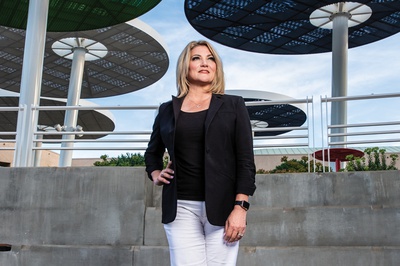Sunday, Aug. 6, 2023 | 2 a.m.
View more of the Sun's opinion section
Editor’s note: As he traditionally does around this time every year, Brian Greenspun is turning over his Where I Stand column to others. Today’s guest is Michelle Romero, the mayor of Henderson.
Addressing the now-decadeslong crisis of substance use and abuse requires bold solutions. As the mayor of Henderson, I am proud to share an innovative, collaborative initiative of law enforcement and health care professionals to address this crisis and its intersections with behavioral health.
Henderson recently launched a Mobile Crisis Intervention Team (MCIT) to more directly respond to behavioral health and substance use crises. As a public safety advocate and mother of a physician, this is a special initiative to me personally, and I think it is an important model for how cities address complex problems.
The impetus behind the MCIT began in 2019 as concerns were growing after a decadelong crisis of overprescribing addictive painkillers for both minor and chronic ailments. People who became addicted to painkillers quickly switched to illicit opioids such as heroin and, more recently, illegally manufactured fentanyl.
Illegally manufactured fentanyl, a potent opioid, is now being mixed with fake opioid pills and other drugs. This mixing can be deadly, even for a first-time user who is only experimenting, and is a primary contributor to stubbornly high opioid overdose deaths. As a grandmother, I am particularly startled by overdose rates among middle- and high school-age children.
Exacerbating the opioid crisis was the COVID-19 pandemic, which increased feelings of loneliness and isolation for many people. National research shows behavioral health and mental health conditions increased during COVID-19, and people with mental health concerns increased their use of substances as a coping mechanism.
Southern Nevada residents face many barriers to accessing treatment for both mental health concerns and substance use disorders. Barriers include the inability to afford health insurance, lack of transportation, job loss and the low number of mental health professionals who accept Medicaid and other insurances, which can lead to months-long wait lists.
Henderson’s Community Development & Services Department began to research data, identify funding opportunities to address these issues, engage with new stakeholders and subject matter experts and augment staff capacity to better address these converging public health crises.
Our state and region are woefully underserved by mental and behavioral health and treatment services, and the impacts are felt by public safety personnel. People call emergency services when they have nowhere else to turn.
In 2022, Community Development & Services applied for, and was awarded, a Department of Justice Comprehensive Opioid, Stimulant & Substance Use Program grant to create a Mobile Crisis Intervention Team, a co-responder unit pairing health care professionals with law enforcement officers to respond to calls collaboratively. Our Mobile Crisis Intervention Team focuses on crisis calls to emergency services involving behavioral health and substance use, including fatal and nonfatal overdoses.
People living with serious mental illness often have their first interactions with the mental health care system through law enforcement agencies. Henderson’s Mobile Crisis Unit will improve safety for officers, reduce use of force, and improve outcomes for people in crisis.
The team is comprised of two mental health clinicians with expertise in substance use and two police officers. The team is designed to grow, and while only a four-person team currently, it is designed to grow to a full, seven-member unit at full build-out.
The Mobile Crisis Intervention Team became operational May 9, just seven months after the city was awarded the grant. Since May, the team has received over 100 referrals and is case managing a variety of needs.
The MCIT staff monitor calls to dispatch relating to suicide, mentally ill individuals, substance use and overdoses. Follow-up is made with clients to divert from jail and emergency rooms and provide case management and other referrals to connect people to resources and treatment.
The co-responder model is a nationally recognized model to deescalate, divert and connect people to services and treatment for long-term support. Henderson’s team is unique in Nevada and is the only team I am aware of that pairs licensed mental health clinicians with law enforcement officers. Our team was designed to deescalate and reduce use of force and provide professional assessments and appropriate referrals.
Henderson’s MCIT is just the beginning of what is possible when we use a cross-disciplinary approach to address complex problems. Henderson is known for being creative, nimble, proactive and driven. Our staff is empowered to come up with new ways of doing things, pursue funding and work across departments to offer our residents better services. We seek continuous improvement and monitor best practices. Our future is bright because we evolve based on the community’s needs. We have the best team in the state and look forward to sharing lessons learned from this initiative with our counterparts throughout Nevada.

